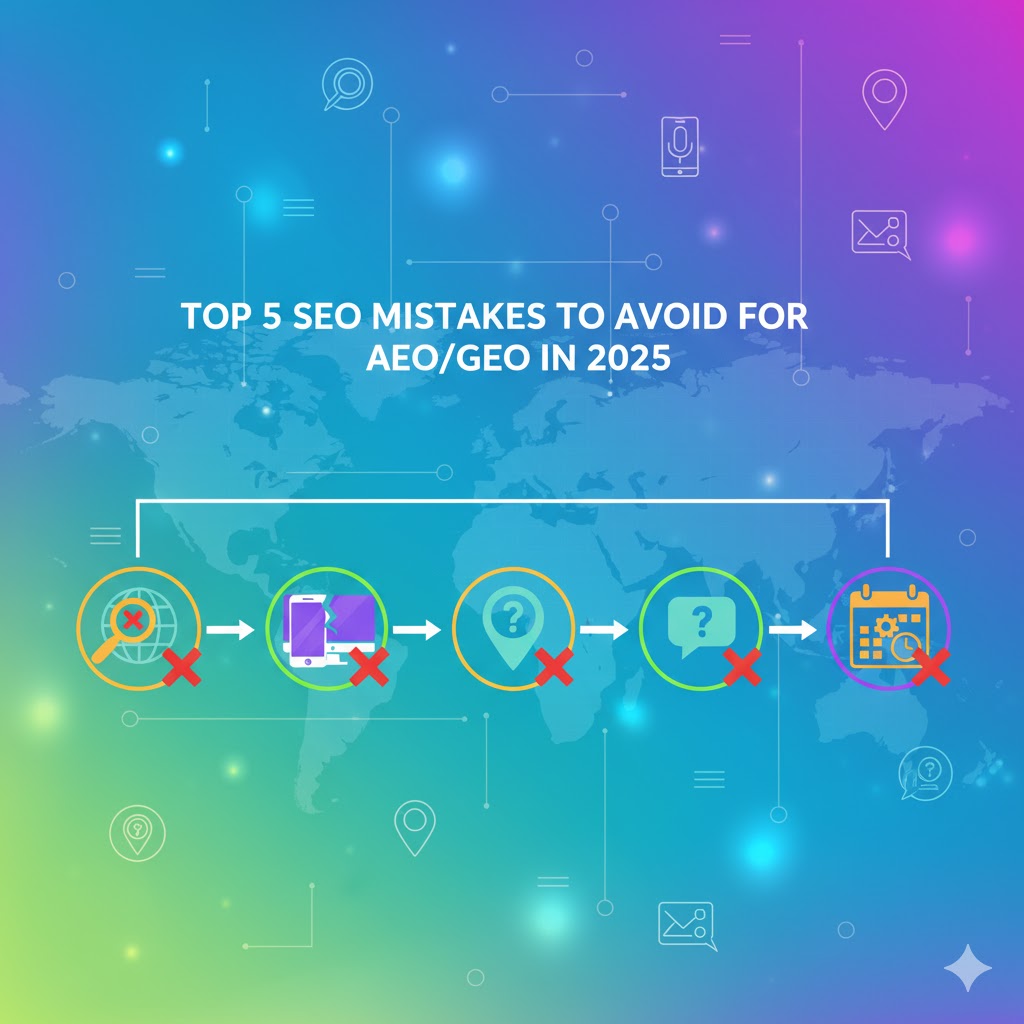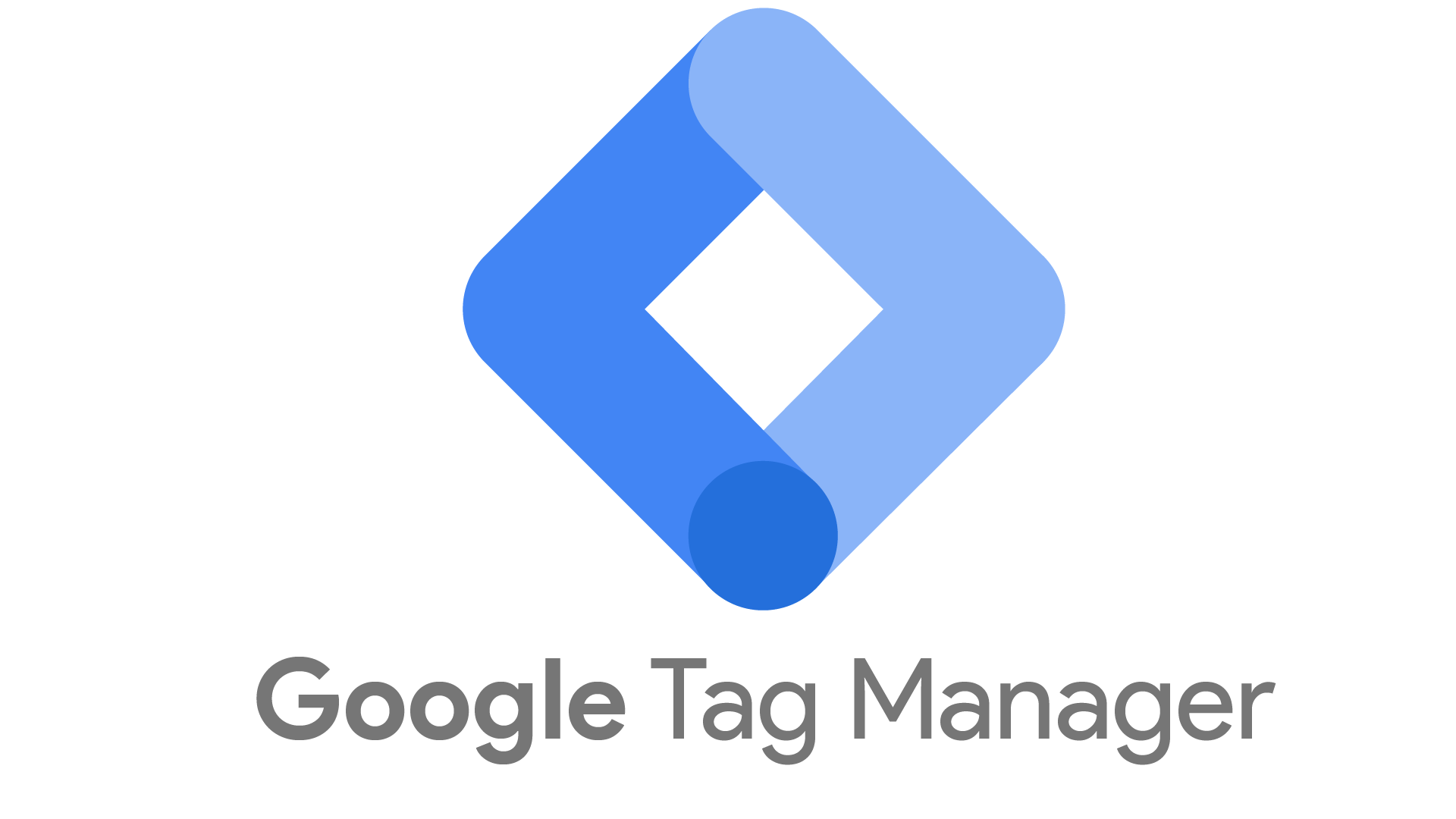
Top 5 SEO Mistakes to Avoid for AEO/GEO in 2025 (October Edition)
By Admin - October 17, 2025
Table of Contents
- The New Era of Search (AEO and GEO) in 2025
- Forgetting the Basics
- Ignoring Search Intent
- Using Generic Content
- Poor Content Structure
- Missing Trust Signals
The New Era of Search (AEO and GEO) in 2025
The way content is now being ranked and displayed have changed with the introduction of AEO (Answer Engine Optimization) and GEO (Generative Engine Optimization). Even then, many search engine optimization companies are struggling to adapt. In this article, we have studied the Top 5 SEO mistakes to avoid for AEO/GEO in 2025. These facts are based on Google’s recent statements and insights from Search Engine Journal with tailored advice for SEO companies in Malaysia.
5 Mistakes to Avoid for AEO and GEO
1. Forgetting the Basics
The basics are the fundamentals, just like learning a new language. You’ll always find yourself going back to the alphabets before even learning the grammar or vocabulary. With SEO, AEO, and GEO, it’s the same concept. Many SEO specialists are making the mistake of thinking traditional SEO no longer matters. Instead, they rush to optimize for AEO and GEO. In doing so, they neglect the core foundations that still drive visibility: content quality, site performance, and trust signals.
Common SEO Mistakes
-
Relying too heavily on AI tools to generate content without human review
-
Neglecting technical SEO
How These SEO Mistakes Hurts Performance
Google’s AI search still references traditional SEO ranking factors to determine which pages deserve visibility in both Search Engine Results Pages (SERPs) and AI-generated summaries. If your site lacks E-E-A-T (Experience, Expertise, Authority, Trustworthiness) or technical health, your website will less likely be featured in AEO or GEO results regardless of how many keywords you stuff.
How to Fix This SEO Issue
-
Enhance user experience: Make your website fast, responsive, and mobile-friendly
-
Focus on originality: Use AI as a support tool, but ensure your final content reflects your brand’s real expertise and voice
-
Maintain technical health: Audit your website regularly for crawl errors, broken links, and slow pages
Start your website with solid SEO foundations before AI optimization. The latest AEO or GEO strategies will fail to perform without fast loading times, credible content, and strong authority signals.
2. Ignoring Search Intent
Modern search engines are about understanding user intent and less about matching keywords. With AEO and GEO powering Google’s AI search results, your content must anticipate what users really mean when they search, not just the words they type. Overlooking intent, especially in this tech-savvy era, will make you miss out on qualified traffic and visibility.
Common SEO Mistakes
-
Creating content purely around high-volume keywords
-
Focus on keywords without exploring the search intent behind these keywords
Why Understanding Search Intent Improves SEO Performance
Google’s AI uses conversational context to decide which pages best solve a user’s question. Websites need to provide answers based on these search intent, not just ranking for a word. If your content doesn’t match intentions, your competitors will replace your spot in both search and AI summaries.
How to Fix This SEO Issue
-
Create intent-based content clusters: Build topic hubs that address every stage of a search journey.
-
Add FAQ and conversational sections: Include natural Q&A formats
-
Use data-driven keyword research: Tools like Google Search Console and AI content insights help identify long-tail, question-based searches.
AI summaries will save you a spot for understanding search intent. To succeed in search engine optimization in Malaysia 2025, you’ll need to focus on providing content that anticipates every layer of search intent. Guide readers through their journey and Google’s AI will view your site as the most valuable resource.
3. Using Generic Content
AI search has gotten a lot smarter and they can now detect repetitive, surface-level content. This occurs even when the content has been written using advanced AI tools. Mass-produced articles are now at a huge risk of being filtered out. If you’re looking to seriously rank for AEO and GEO, your website needs to show depth, originality, and real-world expertise.
Common SEO Mistakes
-
Relying on bulk AI-generated content that has been rephrased from its original content
-
Producing generic blogs with the same structure and advice
Why Generic Content Hurts SEO Performance
Generic or rehashed content sends weak signals to Google about your site’s authority. AI tools now cross-check phrasing, tone, and data consistency across the web, meaning that even if your words are unique, your ideas may still be flagged as low originality. Google’s AI will not recognize your business as a trusted source if your generic content has no local context or brand-specific perspective.
How to Fix This SEO Issue
-
Publish local case studies: Share results from Malaysian brands or campaigns
-
Show expertise through data: Use statistics, performance metrics, and visual reports
-
Include customer stories: Write success stories or client testimonials that illustrate your real-world experience.
-
Be original, not repetitive: Use AI for structure or brainstorming the final voice must reflect your brand’s personality
Automation does not sit well with Google’s AI. Instead of following what every other search engine optimization agency is already saying, become the one at the centre of the spotlight. Add credible insights, authentic storytelling, and expertise that AI cannot do.
4. Poor Content Structure
No matter how great your content is, it will still fail if it is not structured properly. Readability and organization are just as important as search intent. Google’s AEO and GEO systems prioritize content that is easy to scan, summarise, and extract insights from.
Common SEO Mistakes
-
Publishing long, text-heavy articles with poor formatting
-
Mix multiple topics into one page, no subheadings, long blocks of text, and little hierarchy
Why Poor Content Structure Hurts SEO Performance
AI systems and crawlers favour clarity and segmentation. Well-organized pages help search engines identify key topics, intent, and relationships between ideas. To increase your chances of being referenced by Google’s generative AI, use proper headings, bullet points, and summaries. Moreover, human readers tend to skim. If your structure isn’t clean, your bounce rate goes up, sending negative engagement signals that can impact rankings.
How to Fix This SEO Issue
-
Use short paragraphs: Keep your sentences concise and break long thoughts into smaller chunks.
-
Add clear, keyword-rich headings: Include relevant subtopics.
-
Incorporate Q&A formats: Create mini sections that answer common queries
-
Summarize key takeaways: Add short summaries at the end of each section for AI crawlers and quick readers.
-
Leverage bullet points and numbered lists: This makes your information easier for AI to extract and present in snippets.
Good SEO is about how you present it. It tells readers and search engines that your content is authoritative and user-friendly. Hence, optimizing structure can make the difference between being seen and skipped in AI results. Try organizing your ideas to make your content more accessible and earn top visibility across Google’s AI-powered ecosystem.
5. Missing Trust Signals
As Google leans more toward AI-generated search results, trust and credibility remain the foundation of strong rankings. AI systems don’t pull from keyword relevance, instead they prefer expertise, authority, and authenticity. Lacking visible proof of reliability can make the difference between referenced in AI search answers and being ignored entirely.
Common SEO Trust Mistakes
-
Blogs with no author information or credentials.
-
“About” pages with little to no company background.
-
Missing reviews, testimonials, or local client results.
Why Missing Trust Signals Hurts SEO Performance
Google’s AI search and generative summaries rely heavily on E-E-A-T (Experience, Expertise, Authoritativeness, Trustworthiness). When your content lacks identifiable authors, credible citations, or proof of real-world success, it signals low trustworthiness.
This directly affects your ability to rank for competitive queries. AI tools now will prioritize websites that clearly demonstrate verified expertise, transparent information, and genuine community impact.
How to Fix This SEO Issue
-
Citing reliable sources: Link to verified research, case studies, and industry publications to back your claims.
-
Adding author bios: Include names, credentials, and brief expertise descriptions for content contributors.
-
Showcasing company credibility: Display certifications, partnerships, and media mentions to reinforce legitimacy.
-
Featuring real testimonials: Highlight client success stories — especially from local brands that benefited from your services
-
Publishing awards and recognitions: If your brand has won industry awards, display them clearly on your homepage and service pages.
AI may generate answers, but humans ultimately decide who to trust. Your reputation as a brand directly influences how search engines evaluate your authority. By displaying authentic proof of your experience through reviews, bios, local partnerships, and transparent company info, you'll strengthen your human and algorithmic credibility and adapt to the future of SEO in 2030.
FAQs
1. What are the biggest SEO mistakes to avoid for AEO and GEO in 2025?
These mistakes include forgetting the basics of site optimization, ignoring user search intent, relying on generic AI-generated content, poor content structure, and missing trust signals.
2. How does AEO (Answer Engine Optimization) affect SEO in Malaysia?
AEO focuses on optimizing content so it can appear in AI-generated responses and answer boxes. For SEO Malaysia, this means creating structured, conversational, and well-researched content that directly answers user questions. The goal is to be ranked and referenced by Google’s AI.
3. Why is understanding search intent important for SEO success?
AI-powered Google search now prioritizes pages that answer what users truly want to know. By creating content that satisfies informational, commercial, and local intent, you can increase engagement and visibility.
4. How can businesses in Malaysia build trust signals for better SEO?
Display author bios, company background, and real-world credibility on your website. Include testimonials, case studies, certifications, or awards. Showing transparent results and client reviews helps both users and AI see your business as trustworthy and authoritative.
5. How can working with a professional SEO agency improve AEO and GEO results?
An experienced SEO agency in Malaysia ensures your content is optimized for both traditional search and AI-driven visibility. These agencies understand technical SEO, content strategy, local intent, and Google’s evolving AEO and GEO algorithms.





